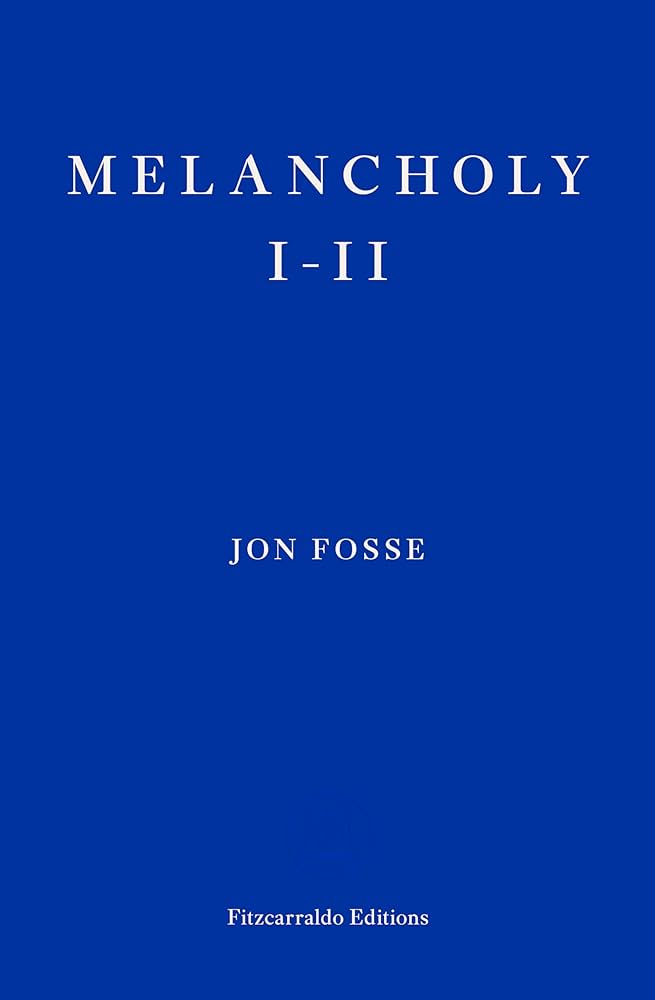Winner of the 2023 Nobel Prize in Literature
Melancholy I-II is a fictional invocation of the nineteenth-century Norwegian artist Lars Hertervig, who painted luminous landscapes, suffered mental illness and died poor in 1902. In this wild, feverish narrative, Jon Fosse delves into Hertervig’s mind as the events of one day precipitate his mental breakdown. A student of Hans Gude at the Academy of Art in Düsseldorf, Hertervig is paralyzed by anxieties about his talent and is overcome with love for Helene Winckelmann, his landlady’s daughter. Marked by inspiring lyrical flights of passion and enraged sexual delusions, Hertervig’s fixation on Helene persuades her family that he must leave. Oppressed by hallucinations and with nowhere to go, Hertervig shuttles between a cafe, where he endures the mockery of his more sophisticated classmates, and the Winckelmann’s apartment, which he desperately tries to re-enter – a limbo state which leads him inexorably into a state of madness. Published here in one volume in English for the first time, Melancholy I-II is a major novel by ‘the Beckett of the twenty-first century’ (Le Monde).
‘Jon Fosse is a major European writer.’
— Karl Ove Knausgaard, author of My Struggle
‘[R]eading Fosse ... what threatens to be heavy proves lightsome. You put on your boots to wade through the mud and find yourself floating along.... Searls is to Fosse what Anthea Bell is to W. G. Sebald, the best possible intermediary.’
— Blake Morrison, London Review of Books
‘Fosse has been compared to Ibsen and to Beckett, and it is easy to see his work as Ibsen stripped down to its emotional essentials. But it is much more. For one thing, it has a fierce poetic simplicity.’
— New York Times
‘He touches you so deeply when you read him, and when you have read one work you have to continue.... What is special with him is the closeness in his writing. It touches on the deepest feelings that you have – anxieties, insecurities, questions of life and death – such things that every human being actually confronts from the very beginning. In that sense I think he reaches very far and there is a sort of a universal impact of everything that he writes. And it doesn’t matter if it is drama, poetry or prose – it has the same kind of appeal to this basic humanness.’
— Anders Olsson, Nobel committee
‘Jon Fosse has managed, like few others, to carve out a literary form of his own.’
— Nordic Council Literary Prize
‘It is desperately poignant…Melancholy I-II is a difficult but deep book…It is essential for understanding his major themes and the evolution of [Fosse’s] technique and artistic vision.’
— Rónán Hession, Irish Times
Praise for Septology
‘Fosse has written a strange mystical moebius strip of a novel, in which an artist struggles with faith and loneliness, and watches himself, or versions of himself, fall away into the lower depths. The social world seems distant and foggy in this profound, existential narrative.’
— Hari Kunzru, author of White Tears
‘I hesitate to compare the experience of reading these works to the act of meditation. But that is the closest I can come to describing how something in the critical self is shed in the process of reading Fosse, only to be replaced by something more primal. A mood. An atmosphere. The sound of words moving on a page.’
— Ruth Margalit, New York Review of Books
‘Septology is the only novel I have read that has made me believe in the reality of the divine, as the fourteenth- century theologian Meister Eckhart, whom Fosse has read intently, describes it: “It is in darkness that one finds the light, so when we are in sorrow, then this light is nearest of all to us.” None of the comparisons to other writers seem right. Bernhard? Too aggressive. Beckett? Too controlling. Ibsen? “He is the most destructive writer I know,” Fosse claims. “I feel that there’s a kind of – I don’t know if it’s a good English word – but a kind of reconciliation in my writing. Or, to use the Catholic or Christian word, peace.”’
— Merve Emre, New Yorker
‘Fosse intuitively — and with great artistry — conveys ... a sense of wonder at the unfathomable miracle of life, even in its bleakest and loneliest moments.’
— Bryan Karetnyk, Financial Times
‘The entire septet seems to take place in a state of limbo. ... Though Fosse has largely done away with punctuation altogether, opting instead for sudden line breaks, his dense, sinuous prose is never convoluted, and its effect is mesmerizing.’
— Johanna Elster Hanson, TLS
Jon Fosse was born in 1959 on the west coast of Norway and is the recipient of countless prestigious prizes, both in his native Norway and abroad. Since his 1983 fiction debut, Raudt, svart [Red, Black], Fosse has written prose, poetry, essays, short stories, children’s books and over forty plays. In 2023, he was awarded the Nobel Prize in Literature ‘for his innovative plays and prose which give voice to the unsayable’.
Damion Searls is a translator from German, Norwegian, French and Dutch, and a writer in English. He has translated nine books by Jon Fosse, including the three books of Septology.
Grethe Kvernes is a native of Samnanger, Western Norway, one county over from where Fosse grew up. She studied translation with William Weaver at Bard College, and currently lives with her family in upstate New York.


